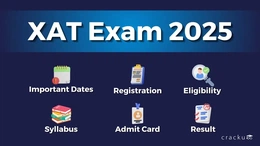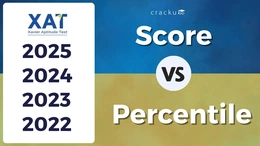How to Analyze XAT Mock Test is one the biggest concern among aspirants. The XAT exam is a challenging test that requires a strategic approach. To excel in this exam, it's crucial to analyze your XAT mock test performance . By understanding the strengths and weaknesses, one can identify areas for improvement and fine-tune their XAT preparation strategy.
In this blog post, we will discuss How to Analyse XAT exam Mock Test the right way! We will delve into the key aspects of analyzing mock test results and provide actionable tips to improve XAT exam performance. We will also cover the common errors in mock tests that many aspirants face. With our Section-wise XAT mock analysis plan, one can maximise their XAT score significantly.
Also, check: XAT Decision Making
XAT Section-wise Mock Analysis
The first step in analyzing XAT mock test is to break down the performance section-wise. This will help one to identify the sections where one needs to focus more.
Verbal Ability and Logical Reasoning (VALR)
- Analyze mock test by checking accuracy and speed in reading comprehension passages. Identify the types of passages that you find challenging and practice reading similar passages.
- Revisit and evaluate the wrong answers. Compare your reasoning with the one provided in the solution.
- Evaluate your performance in vocabulary-based questions, sentence correction, and critical reasoning. Focus on improving your vocabulary and grammar skills.
- Analyze your performance in analytical reasoning, decision-making, and reasoning ability questions. Practice solving various types of XAT logical reasoning questions.
- Keep a careful track of the common errors in mock test. If needed, note them in a separate word doc.
Decision Making and Analytical Reasoning (DMAR)
- Evaluate your ability to make decisions under pressure. Analyze the factors considered while making decisions and identify any biases.
- Assess your mock test performance in puzzles and critical reasoning questions. Practice solving different types of puzzles and improve your analytical skills.
- In the first reading, try to identify the core of t he problem. Often the presented issue would just be a symptom of the real underlying problem. Focus on the bigger picture.
- Make sure to have enough reasons to reject each of the other options before selecting your answer.
- While Analyzing mock test results, take time to understand the rationale behind the provided answer. Seek help from mentors/friends if needed.
Also Read, XAT Exam Date 2026, Notification, Registration, Exam Fees
Quantitative Ability and Data Interpretation (QA DI)
- Analyze your performance in arithmetic, algebra, geometry, and number system questions. Identify the XAT Important topics where you need to strengthen your concepts.
- Try to solve the unanswered/wrong questions again, without looking at the solution.
- In case you don't recall a concept, jump back to mock Test Strategy notes.
- Evaluate your ability to interpret data presented in various formats (tables, graphs, charts). Practice solving data interpretation questions from XAT previous year papers and mock tests.
Also Read, XAT Exam Analysis, Check Major Changes in XAT 2025
How to Improve XAT Score by Analyzing XAT Exam Mocks?
One can Improve XAT Mock Test Scores significantly with consistent practice. Focus on building strong fundamentals in Quantitative Ability, Data Interpretation, Verbal Ability, and Logical Reasoning. Take regular mock tests to assess your progress and identify areas for improvement.
Analyze your mistakes and learn from them. Time management is crucial, so practice time-bound tests. Develop effective strategies for each section, such as skipping difficult questions and returning to them later. Stay calm and composed during the exam, and maintain a positive mindset.
Time Management for XAT Mock Test
Time management is a crucial factor in the XAT exam. Analyze how you managed your time during the mock test.
- Identify Time-Consuming Sections: Pinpoint the sections where you spent excessive time.
- Improve Time Management Strategies: Practice time-bound mock tests to improve your speed and accuracy.
- Develop Effective Time Management Techniques: Use techniques like skipping difficult questions and returning to them later.
Common Errors in XAT Mock Tests and How to Avoid Them
- Careless Mistakes: Analyze your incorrect answers to identify any patterns of careless mistakes. Practice mindfulness and focus on accuracy.
- Poor Time Management: As mentioned earlier, time management is crucial. Practice time-bound mock tests to improve your speed and accuracy.
- Lack of Practice: Consistent practice is key to improving your performance. Practice regularly from various sources like previous year papers and mock tests.
Tips to Improve Your XAT Performance
- Practice Regularly: Consistent practice is the key to success. Practice from various sources like previous year papers and mock tests.
- Take Mock Tests Regularly: Take mock tests regularly to assess your progress and identify areas for improvement.
- Analyze Your Performance: Analyze your mock test performance in detail to understand your strengths and weaknesses.
- Improve Time Management: Practice time-bound mock tests to improve your speed and accuracy.
- Focus on Accuracy: Prioritize accuracy over speed. Avoid making careless mistakes.
- Stay Calm and Composed: Maintain a calm and composed mindset during the exam.
- Positive Mindset: A positive mindset can significantly impact your performance. Believe in yourself and your abilities.
By following these tips and analyzing your mock test performance meticulously, you can significantly improve your chances of success in the exam.
Also Read, XAT Score vs Percentile 2024, Previous Year's Comparison
Conclusion
By following these strategies and consistently analyzing your mock tests, you can significantly improve your performance and achieve your desired XAT score. Remember, practice is key, and a positive mindset can make a significant difference.
Ready to take your XAT preparation to the next level? Sign up for Cracku's XAT mock tests and experience the difference. Our comprehensive analysis tools will help you identify your strengths and weaknesses and devise a personalized study plan.


























